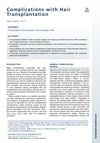3 citations,
June 2018 in “Internal Medicine” Recombinant thrombomodulin can effectively treat severe complications in Cronkhite-Canada syndrome.
 January 2021 in “Reactions Weekly”
January 2021 in “Reactions Weekly” Finasteride might cause rare blood clot in brain for baldness patients.
 17 citations,
May 2014 in “Naunyn-Schmiedeberg's Archives of Pharmacology”
17 citations,
May 2014 in “Naunyn-Schmiedeberg's Archives of Pharmacology” 7-Phloroeckol from brown algae may help hair grow.
 62 citations,
March 2008 in “American Journal of Human Genetics”
62 citations,
March 2008 in “American Journal of Human Genetics” Hair loss gene found on chromosome 3q26.
 24 citations,
August 2013 in “Facial Plastic Surgery Clinics of North America”
24 citations,
August 2013 in “Facial Plastic Surgery Clinics of North America” Hair restoration surgery can have complications; success depends on patient education, careful planning, and proper execution.
 12 citations,
April 2020 in “Facial Plastic Surgery Clinics of North America”
12 citations,
April 2020 in “Facial Plastic Surgery Clinics of North America” Hair transplant complications are rare with good planning and technique, but risks include infection, bleeding, and patient dissatisfaction.
 2 citations,
March 2021 in “Carpathian Journal of Food Science and Technology”
2 citations,
March 2021 in “Carpathian Journal of Food Science and Technology” Caraway, Chinese chives, and cassia may improve health and prevent diseases due to their nutrients and medicinal properties.
 1 citations,
April 2019 in “Advances in Cosmetic Surgery”
1 citations,
April 2019 in “Advances in Cosmetic Surgery” Platelet-rich plasma shows potential for hair growth, but more research is needed to determine the best preparation method.

Off-label drug use can be risky but sometimes beneficial when standard treatments fail.
 237 citations,
December 2001 in “Urology”
237 citations,
December 2001 in “Urology” Blocking the enzyme 5α-reductase can shrink the prostate and help treat enlarged prostate issues.
 195 citations,
July 2005 in “American Journal of Human Genetics”
195 citations,
July 2005 in “American Journal of Human Genetics” Genetic variation in the androgen receptor gene mainly causes early-onset hair loss, with maternal inheritance playing a key role.
 165 citations,
January 2008 in “Journal of biomaterials science. Polymer ed.”
165 citations,
January 2008 in “Journal of biomaterials science. Polymer ed.” The peptide GHK-Cu helps heal and remodel tissue, improves skin and hair health, and has potential for treating age-related inflammatory diseases.
 147 citations,
January 2014 in “American Journal of Clinical Dermatology”
147 citations,
January 2014 in “American Journal of Clinical Dermatology” Laser device increases hair density, safe for treating hair loss in men and women.
 140 citations,
January 2009 in “JEADV. Journal of the European Academy of Dermatology and Venereology/Journal of the European Academy of Dermatology and Venereology”
140 citations,
January 2009 in “JEADV. Journal of the European Academy of Dermatology and Venereology/Journal of the European Academy of Dermatology and Venereology” Liposomes improve drug delivery and reduce skin irritation in dermatology.
 136 citations,
May 2016 in “Phytotherapy Research”
136 citations,
May 2016 in “Phytotherapy Research” Turmeric may have benefits for skin health, but more research is needed to confirm its effectiveness.
 136 citations,
April 2013 in “Clinical Cancer Research”
136 citations,
April 2013 in “Clinical Cancer Research” The drug IPI-926 is safe at 160 mg daily and may help treat certain tumors, especially basal cell carcinoma.
 115 citations,
January 2014 in “Journal of Cutaneous and Aesthetic Surgery”
115 citations,
January 2014 in “Journal of Cutaneous and Aesthetic Surgery” Platelet-rich plasma (PRP) is a cheap and easy treatment for hair loss, but not suitable for everyone. It also helps in healing ulcers, rejuvenating skin, and improving hair transplants.
 70 citations,
August 2020 in “Nanomaterials”
70 citations,
August 2020 in “Nanomaterials” Electrospun nanofibers show promise for enhancing blood vessel growth in tissue engineering but need further research to improve their effectiveness.
 53 citations,
November 1992 in “Mayo Clinic Proceedings”
53 citations,
November 1992 in “Mayo Clinic Proceedings” HIV can cause unusual and severe skin problems that are hard to treat.
 49 citations,
July 2009 in “Journal of the American Academy of Dermatology”
49 citations,
July 2009 in “Journal of the American Academy of Dermatology” Some people experienced hair loss after mesotherapy treatments for hair loss.
 48 citations,
February 2008 in “Nutrition in Clinical Practice”
48 citations,
February 2008 in “Nutrition in Clinical Practice” Dietary changes, including weight loss and a balanced diet, are important for managing PCOS, especially in overweight women.
 47 citations,
December 2019 in “Frontiers in immunology”
47 citations,
December 2019 in “Frontiers in immunology” A new mutation in the STING protein causes a range of symptoms and its severity may be affected by other genetic variations; treatment with a specific inhibitor showed improvement in one patient.
 46 citations,
September 2016 in “Clinical, Cosmetic and Investigational Dermatology”
46 citations,
September 2016 in “Clinical, Cosmetic and Investigational Dermatology” Hormonal treatments are effective for severe or persistent acne and should be used with other acne therapies, considering potential side effects.
 38 citations,
February 2012 in “Aesthetic Surgery Journal”
38 citations,
February 2012 in “Aesthetic Surgery Journal” Facial rejuvenation surgery has evolved to yield natural results with low complication rates, and more men and older patients are choosing this surgery.
 37 citations,
May 2004 in “Multiple Sclerosis Journal”
37 citations,
May 2004 in “Multiple Sclerosis Journal” The article concludes that proper injection techniques and patient education can prevent serious skin reactions from multiple sclerosis medications.
 36 citations,
July 2020 in “Frontiers in Medicine”
36 citations,
July 2020 in “Frontiers in Medicine” Spironolactone might help protect against severe lung problems in COVID-19 patients.
 36 citations,
October 2000 in “British Journal of Dermatology”
36 citations,
October 2000 in “British Journal of Dermatology” A different gene near the hairless gene on chromosome 8p21 causes a rare hair loss condition in a German family.
 34 citations,
September 2020 in “BMC Endocrine Disorders”
34 citations,
September 2020 in “BMC Endocrine Disorders” Existing drug dexamethasone may lower death risk in severe COVID-19 cases; more research needed for other drugs.
 32 citations,
September 2018 in “Clinical Obstetrics and Gynecology”
32 citations,
September 2018 in “Clinical Obstetrics and Gynecology” Hormone therapy for transgender females increases the risk of blood clots and requires careful dosing, monitoring, and lifelong management.
 29 citations,
September 2020 in “International Journal of Molecular Sciences”
29 citations,
September 2020 in “International Journal of Molecular Sciences” The document concludes that freeze-dried platelet-rich plasma shows promise for medical use but requires standardization and further research.




























